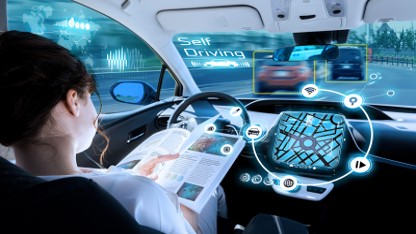Chair RISK – Project “Steering the deployment of tomorrow’s vehicles”

Making actors responsible, to encourage them to control risks and contribute fairly to the coverage of harms.
↘ To date, the coverage of risk and the sharing of responsibility in the event of accidents involving autonomous vehicles have still not been decided.
The emergence of new actors – the algorithm and its designer – and the near-disappearance of others – the driver, who becomes a passive user – lead to major upheavals compared to the case of “classic” cars.
The legal debate on the sharing of responsibility between the user, the car manufacturer and the designer of the algorithm is still not settled, and focuses on the question of the fairness of the sharing.
Firstly, this project aims to contribute to this legal debate by approaching it from the angle of incentives: beyond a “fair” sharing of the costs generated by an accident, how can this sharing be defined in such a way as to encourage each of the actors to take the necessary measures to control the risk to which they contribute? In addition, it will also be necessary to reflect on the role of the insurer in a new situation where the risk of accident is reduced at the individual level, and could thus be mutualised within large fleets of vehicles operated by the car manufacturers themselves.
↘ BETA is the leading research centre in economics and management in the Grand-Est region. It brings together researchers from all fields of economics, and is particularly well known in the field of risk management and the study of individual behaviour in the face of risk. It relies on a team of ten or so researchers recognised in the field, and on an experimental economics laboratory.
United within the RISK Chair, these researchers intend to better understand and manage the main risks of tomorrow: natural and climatic risks, and technological risks.
Initially supported by the University of Strasbourg through the award of an IDEX research contract, initial work has made it possible to map possible legal frameworks, and initial experimental studies have been carried out, with a view to highlighting the incentive virtues of these legal frameworks. Specifically, the first experimental studies tested the risk control incentives provided by three modes of responsibility sharing between the algorithm designer, the producer/seller of the car, and the owner/user.
.
Further analysis would be needed to achieve a comprehensive study of the possible ways of sharing risk and situations that may be encountered.
↘ Autonomous vehicles:
the main issues
• Status of the user: should he be held liable?
• Dealing with new uses -> digital platforms, end of individual ownership and emergence of large fleets of rented vehicles: what place for the insurer in the face of the possibility of intra-fleet risk pooling?
• Integrating the algorithm and its designer -> encouraging prevention without hindering innovation and economic initiative

Become a sponsor and support this project!
In order to contribute and to count in these important fields, which will be a source of major stakes in the future, the BETA laboratory of the University of Strasbourg wishes to increase the impact and the research opportunities of this research team.
By associating yourself with this project as a sponsor, we offer you the opportunity to:
- Benefit from the perspectives on the new roles of insurers.
- Benefit from the recognition programme offered to sponsors of the University of Strasbourg.
Project leader:
Julien JACOB, associate professor in economics | julienjacob@unistra.fr
Fondation Université de Strasbourg | fondation@unistra.fr
03 68 85 13 10
Our final objective is to shed additional light on existing studies, which have indeed focused on the “feasibility” and equity aspects of the legal frameworks “candidate” for the future supervision of the sector.
Studying the incentive role of this legal framework will provide input for the forthcoming legislative debate, since any risk management strategy must, in addition to the question of how to deal with it, also consider the best way to prevent it.
Finally, the changes in the automobile market that may result from these technological advances (and the new consumption patterns that they bring) should raise questions about the role of insurers.
What will your donation be used for?
- Fund experimental studies to establish a complete mapping of the incentive effects induced by all the candidate legal frameworks
- To fund a PhD scholarship on future mobilities and the challenges of artificial intelligence.






